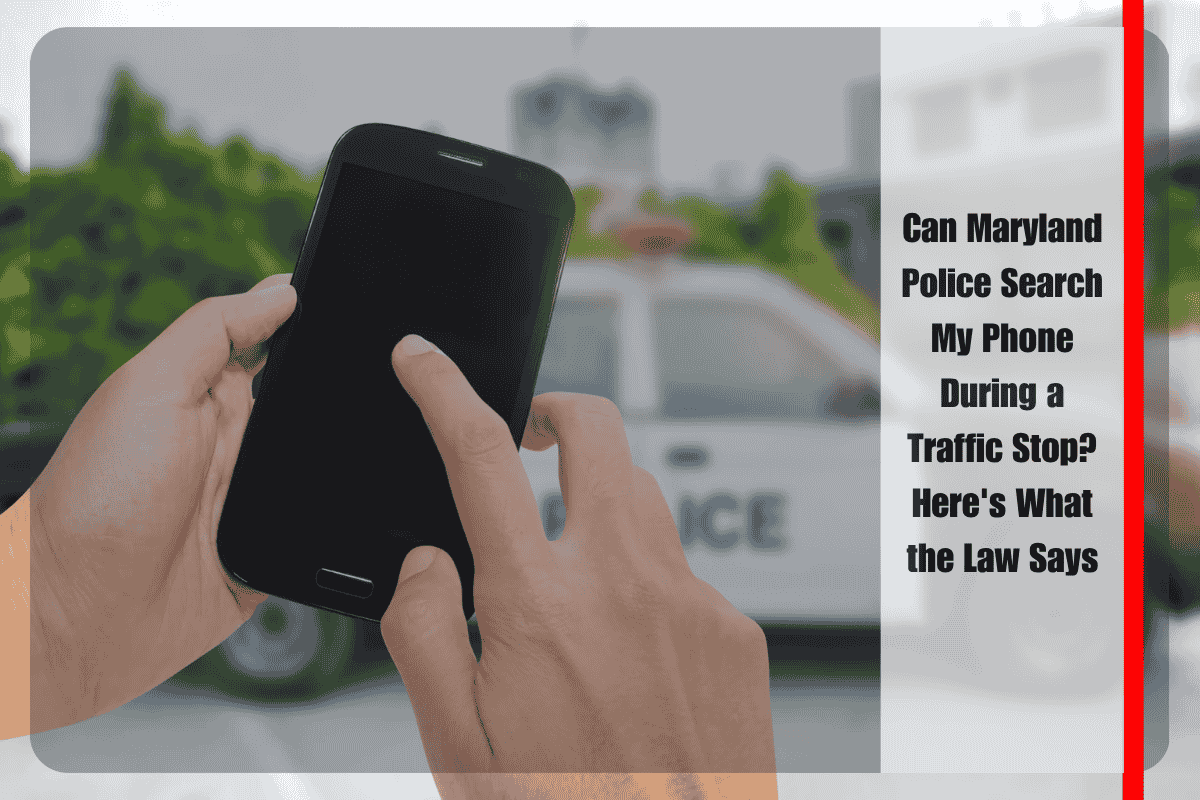Traffic stops can be stressful, and it’s natural to wonder about your rights when interacting with law enforcement. One common concern for many drivers is whether police officers have the authority to search their phone during a traffic stop. With the rise of smartphones, these devices often contain sensitive information, and people are increasingly concerned about their privacy. If you’re pulled over in Maryland, understanding the law surrounding phone searches can help you navigate the situation with confidence.
The Fourth Amendment and Your Right to Privacy
The Fourth Amendment of the United States Constitution protects citizens against unreasonable searches and seizures by the government. This means that, in general, law enforcement cannot search your personal belongings, including your phone, without a warrant or your consent. However, there are some exceptions to this rule, and the situation may vary depending on the specific circumstances of a traffic stop.
Search of Your Phone During a Traffic Stop in Maryland
In Maryland, as in other states, police generally need a warrant to search the contents of your phone. This means that during a regular traffic stop, law enforcement officers do not have the right to search your phone unless you give them permission or there is a specific exception that allows them to do so.
Exceptions to the Warrant Requirement
While police generally need a warrant to search your phone, there are some exceptions where they may legally search it without one. These exceptions are based on circumstances where immediate action is necessary for public safety, evidence preservation, or other urgent matters.
Consent: If you voluntarily agree to allow the police to search your phone, they can do so without a warrant. However, you have the right to refuse consent. It’s important to remember that you are under no obligation to allow police to search your phone. If you refuse, the officers would need a warrant or a valid legal reason to proceed with the search.
Search Incident to Arrest: If you are arrested during the traffic stop, the police may search your phone as part of a search incident to the arrest. However, recent legal decisions, including a Supreme Court ruling in 2014 (Riley v. California), state that police generally need a warrant to search your phone even after an arrest unless there are exceptional circumstances. The ruling emphasizes that smartphones contain a vast amount of personal data, and searching them without a warrant would violate privacy rights.
Exigent Circumstances: There are certain situations where the police can search your phone without a warrant if there is an urgent need, such as if they believe the phone contains evidence that could be destroyed or if immediate action is required to protect someone’s safety. For example, if the phone is being used to communicate with a suspect in a crime, officers might be able to act quickly to prevent the destruction of evidence. However, these situations are rare and require specific, immediate threats.
What If Police Ask to Unlock Your Phone?
If police ask you to unlock your phone, they still need either your consent or a warrant to access its contents. In Maryland, you cannot be forced to unlock your phone with your fingerprint or face recognition. However, you may be compelled to provide a passcode or PIN in some cases. This legal issue is still debated in many jurisdictions, and some courts have ruled that forcing someone to provide their phone’s passcode does not violate their Fifth Amendment right against self-incrimination. That said, you can still refuse to provide the passcode, and it’s important to be aware of how these laws are applied in your specific situation.
How to Protect Your Rights During a Traffic Stop
If you’re pulled over and officers ask to search your phone, the best course of action is to remain calm and assert your rights. Politely decline to consent to a search if you don’t want your phone searched. You can say something like, “I do not consent to a search of my phone.” It’s important to be respectful during the interaction, as refusing consent should not escalate the situation.
If the police do proceed to search your phone or ask you to unlock it, you can ask if they have a warrant. If they do not, and you have not consented, they may be violating your rights. If you feel your rights have been violated, you should consult with an attorney afterward to discuss any potential legal action.
In Maryland, police cannot search your phone during a traffic stop without your consent or a valid legal reason, such as a warrant or exigent circumstances. While law enforcement may ask for permission to search your phone, you are under no obligation to comply, and you have the right to refuse. If you’re arrested, the police may search your phone, but they generally need a warrant for that search. Understanding your rights in these situations can help protect your privacy and ensure that your interactions with law enforcement are fair and legal.
Sources
[1] https://thedailyrecord.com/2022/09/07/md-high-court-sets-limits-on-smartphone-search-warrants/
[2] https://www.careylawoffice.com/2022/09/26/maryland-court-rules-authorities-must-limit-cellphone-searches/
[3] https://www.wiley.law/newsletter-September-2022-PIF-Maryland-Court-of-Appeals-Updates-the-Particularity-Standard-for-Cell-Phone-Searches-as-US-Courts-Develop-New-Doctrines-for-Electronic-Evidence
[4] https://www.cookieyes.com/blog/maryland-online-data-privacy-act-modpa/
[5] https://www.cliffordchance.com/insights/resources/blogs/talking-tech/en/articles/2024/08/maryland-online-data-privacy-act–an-overview.html












